PLAN OF THE COLLECTED WORKS
Edited by Bruce Caldwell
| Volume I | The Fatal Conceit: The Errors of Socialism (1988) |
| Volume II | The Road to Serfdom: Text and Documents (2007) |
| Volume III | The Trend of Economic Thinking: Essays on Political Economists and Economic History (1991) |
| Volume IV | The Fortunes of Liberalism and the Austrian School: Essays on Austrian Economics and the Ideal of Freedom (1992) |
| Volume V | Good Money, Part I: The New World (1999) |
| Volume VI | Good Money, Part II: The Standard (1999) |
| Volume VII | Business Cycles, Part I |
| Volume VIII | Business Cycles, Part II |
| Volume IX | Contra Keynes and Cambridge: Essays, Correspondence (1995) |
| Volume X | Socialism and War: Essays, Documents, Reviews (1997) |
| Volume XI | Capital and Interest |
| Volume XII | The Pure Theory of Capital |
| Volume XIII | Studies on the Abuse of Reason |
| Volume XIV | The Sensory Order and Other Essays |
| Volume XV | The Market and Other Orders |
| Volume XVI | John Stuart Mill and Harriet Taylor |
| Volume XVII | The Constitution of Liberty |
| Volume XVIII | Essays on Liberty |
| Volume XIX | Law, Legislation, and Liberty |
| Supplement | Hayek on Hayek: An Autobiographical Dialogue (1994) |
The plan is provisional. Minor alterations may occur in titles of individual books, and several additional volumes may be added.
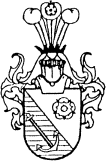
THE COLLECTED WORKS OF
F. A. Hayek
VOLUME XII
THE PURE THEORY OF CAPITAL
EDITED BY
LAWRENCE H. WHITE

The University of Chicago Press
F. A. HAYEK (18991992), recipient of the Presidential Medal of Freedom in 1991 and cowinner of the Nobel Memorial Prize in Economics in 1974, was a pioneer in monetary theory and the principal proponent of libertarianism in the twentieth century.
BRUCE CALDWELL is the Joe Rosenthal Excellence Professor in the Department of Economics at the University of North Carolina, Greensboro. He is the author of Beyond Positivism: Economic Methodology in the Twentieth Century and Hayeks Challenge: An Intellectual Biography of F.A. Hayek, the latter also published by the University of Chicago Press.
LAWRENCE H. WHITE is the F. A. Hayek Professor of Economic History at the University of MissouriSt. Louis. He is author of several books, most recently The Theory of Monetary Institutions. His work has appeared in the American Economic Review and other leading journals. He is a visiting professor at Queens University Belfast, and has recently been a visiting lecturer at the Swiss National Bank.
The University of Chicago Press, Chicago 60637
The University of Chicago Press, Ltd., London
2007 by the Estate of F. A. Hayek
All rights reserved. Published 2007
Printed in the United States of America
16 15 14 13 12 11 10 09 08 07 1 2 3 4 5
ISBN-13: 978-0-226-30299-1 (cloth)
ISBN-10: 0-226-32099-5 (cloth)
ISBN-13: 978-0-226-32129-5 (e-book)
Library of Congress Cataloging-in-Publication Data
Hayek, Friedrich A. von (Friedrich August), 18991992.
The pure theory of capital / F. A. Hayek; edited by Lawrence H. White; [editorial foreword], Bruce Caldwell.
p. cm. (The collected works of F. A. Hayek; v. 12)
Originally published: London : Macmillan and Co., 1941.
Two more appendices that were not in the original have been added. The first is a one-page comment by Hayek on an article by Professor Friedrich Lutz titled Professor Hayeks Theory of Interest. Both the Lutz paper and Hayeks comment appeared in the November 1943 issue of the journal Economica. contains a longer piece by Hayek, Time-Preference and Productivity: A Reconsideration, that appeared in the February 1945 issue of Economicap..
Includes bibliographical references and index.
ISBN-13: 978-0-226-32099-1 (cloth : alk. paper)
ISBN-10: 0-226-32099-5 (cloth: alk. paper)
1. Capital. 2. Investments. 3. Interest. I. White, Lawrence H. (Lawrence Henry) II. Title.
HB501.H392 2007
332'.041dc22 2006025441
 The paper used in this publication meets the minimum requirements of the American National Standard for Information SciencesPermanence of Paper for Printed Library Materials, ANSI Z39.48-1992.
The paper used in this publication meets the minimum requirements of the American National Standard for Information SciencesPermanence of Paper for Printed Library Materials, ANSI Z39.48-1992.
THE COLLECTED WORKS OF F. A. HAYEK
Founding Editor: W. W. Bartley III
General Editor: Bruce Caldwell
Published with the support of
The Hoover Institution on War, Revolution and Peace Stanford University
The Earhart Foundation
The Pierre F. and Enid Goodrich Foundation
The Morris Foundation, Little Rock
CONTENTS
EDITORIAL FOREWORD
Bruce Caldwell
The Pure Theory of Capital occupied a great deal of Hayeks time during the 1930s. As noted in the editors introduction by Lawrence H. White, there were some false starts as well as some full stops. Though he was more or less done with it by the end of 1939, the exigencies of the war delayed its publication until 1941.
It is a great pleasure to present here, as volume number 12 in the series, the Collected Works version of the book. As with all the other volumes, this one contains an editors introduction as well as numerous explanatory footnotes to help the reader follow Hayeks argument. More so than is usually the case, both the introduction and the explanatory notes are invaluable aids in this volume, for capital theory is one of the most opaque areas of economics, and Hayeks book is accordingly one of the most difficult of his technical contributions. We are in Professor Whites debt for the light he sheds on the arguments in the text, as well as for placing the book within an historical and theoretical context.
The text is faithful to the original, and includes Hayeks preface, both the standard and the analytical table of contents, as well as the three appendices that Hayek had originally included. Two more appendices that were not in the original have been added. The first is a one-page comment by Hayek on an article by Professor Friedrich Lutz titled Professor Hayeks Theory of Interest. Both the Lutz paper and Hayeks comment appeared in the November 1943 issue of the journal Economica. contains a longer piece by Hayek, Time-Preference and Productivity: A Reconsideration, that appeared in the February 1945 issue of Economica. Following the appendices is an index listing pages where terms are defined, as well as Hayeks bibliography, both of which were included in the original. Though all of Hayeks citations in the text have been standardized to reflect modern form, the bibliography is not: it is just as it was in the original.
I thank Larry White for doing a superb job of editing this volume, and also for doing the initial creation of a master text from which to work. Kevin Welding produced master copies of the appendices, and Brandon Beck of the index of definitions and the bibliography. Brandon also assisted me in doing a line-by-line check of the text against the original. I finally thank the Earhart Foundation, the Pierre F. and Enid Goodrich Foundation, and the Morris Foundation for their financial support of this volume and of the
Next page
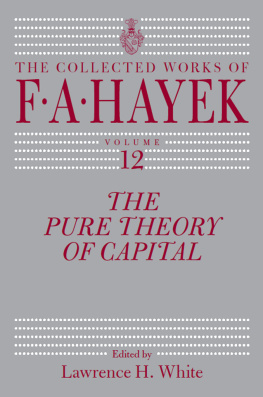
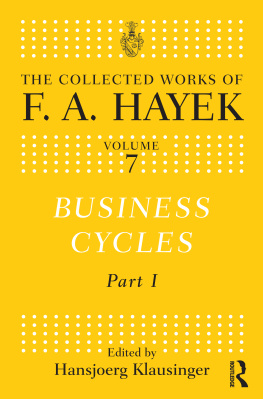
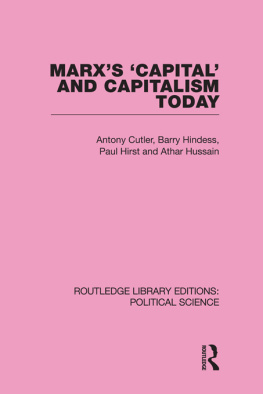

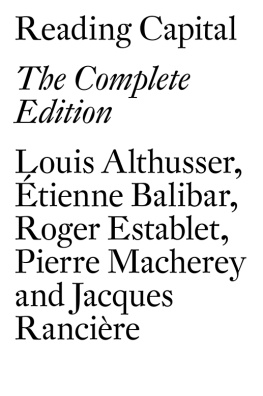
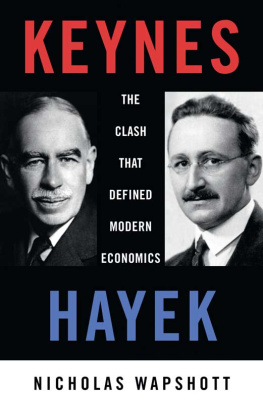
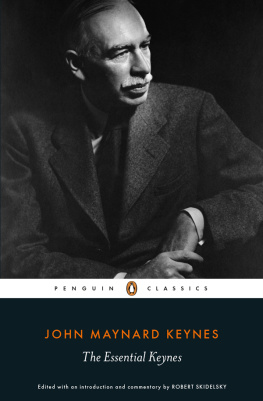
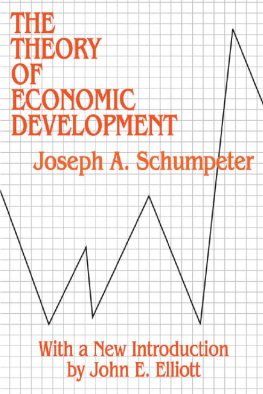
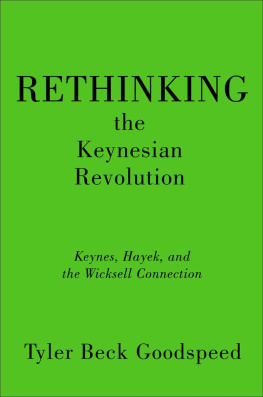
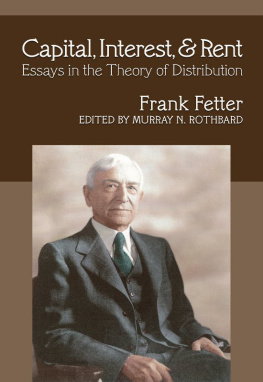

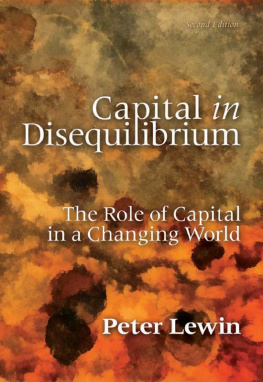


 The paper used in this publication meets the minimum requirements of the American National Standard for Information SciencesPermanence of Paper for Printed Library Materials, ANSI Z39.48-1992.
The paper used in this publication meets the minimum requirements of the American National Standard for Information SciencesPermanence of Paper for Printed Library Materials, ANSI Z39.48-1992.